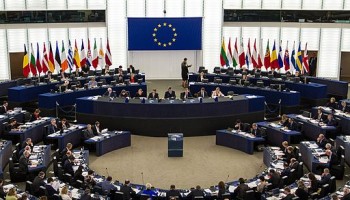Over 90 percent of those who took part in the survey in Serbia, Croatia and Bosnia-Herzegovina say that business climate is submerged in corruption and that the legal system cannot be expected to do any good.
Only 21 percent thought that judicial system is doing its job well, while others believe it to be yet another firm foothold of corruption.
It looks like Gallup’s poll was a “perceptions” poll, along the lines of Transparency International’s corruption perceptions indices, which is an entirely subjective poll. But no one is disputing the takeaway, that corruption is no good for investment or other trappings of normal life. Even in the neighborhood just outside the so-called Western Balkans (the new name for the former Yugoslavia, minus Slovenia but plus Albania), a US ambassador told his host country much the same thing:
The U.S. ambassador says Romania must reform its legal system to encourage foreign business in Romania.
Mark H. Gitenstein says corruption and "slow or opaque" government explanations of legal decisions are deterring foreign investors.
Romania's priority is to reform the justice system to make it "transparent, fair and efficient," the ambassador was quoted as saying in an interview published Monday by Mediafax news agency.
But back in the “Western Balkans,” the story of two fugitives convicted in absentia of involvement in the 2003 murder of Serbia’s prime minister continued last week. One fugitive, a Croatian citizen named Sretko Kalinic, has been moved from a Zagreb hospital to spend a month in a prison hospital because he poses a flight risk. Kalinic was hospitalized earlier this month after being shot, allegedly by the second fugitive, Milos Simovic, who was arrested trying to cross the border into Serbia.
Whether Kalinic will say anything to the police is anyone’s guess, but a Belgrade weekly reported last week that Simovic is ready to tell the police everything about the background of the 2003 assassination, and to become what the weekly called a “collaborating witness” in return. Simovic might indeed be likely to talk: He was not only sentenced to 30 years for his involvement in the Zoran Djindjic assassination, but he also received another 40-year sentence for 19 other murders. And the authorities might be keen to answer the questions left unanswered by the four-year trial: Was there a wider political conspiracy, as one of the murderers claimed, and why was it that the main suspect turned himself in to the police after hiding out in Belgrade for six months after the murder?
Kalinic, meanwhile, might find himself in Serbia very soon. Croatia and Serbia are slated to sign a special extradition agreement Tuesday, one that would allow Croatia to extradite its citizens wanted in Serbia on charges of organized crime or corruption. You can read a cheerful story from the Economist on the ties that are binding Serbian and Croatian authorities on organized crime here.
Bulgaria: Verdict expected soon on EU funds case
A Bulgarian court is soon expected to hand down a verdict in a notorious case involving a business conglomerate allegedly siphoning off €7.5 million in European Union aid money earlier this decade. The Sofia court should decide this week whether businessman Mario Nikolov, his wife and six others defrauded an EU agriculture program by claiming that second-hand equipment they purchased for meat-processing industries was in fact new. The case was widely cited in the Western press as an example of Bulgaria’s corruption when the EU froze €500 million in aid to Bulgaria in 2008. The EU is reportedly following the case closely.
The courts do seem to be the weakest link even in a chain of weak links that make up Bulgaria’s legal system. The Sofia city prosecutor, however, told Bulgarian television last week that he’s not giving up, announcing fresh leads in a case against two suspected organized crime bosses who were acquitted of various murders earlier this month.
Further east
For those scratching their heads about the recent violence in Kyrgyzstan, Transitions Online has an angle which it says many Western reports are missing – the organized crime angle:
It seems clear that there was some deliberate provocation of the unrest – though the culprits seem more likely to have been local political bosses rather than internationally-based Islamic militants. The fall of (former president Kurmanbek) Bakiev meant the ejection from power of his backers in the south – and the opportunity for Uzbek groups in the region to press for more concessions. One element missing from most Western reports is that these political clans have close ties with organized crime groups. Details are fuzzy, but one can assume that some of these groups are involved with the Afghan heroin trade. Sanobar Shermatova, writing for the very informative website ferghana.ru, argued that a key development was the murder on 7 June of the ethnic Uzbek mafia boss Aibek Mirsidikov, a Bakiev supporter and rival of fellow-Uzbek business leader Kadyrzhan Batyrov.
And in Russia, apparently it’s not just those stereotypical tattooed Vori mobsters that people should be worrying about. Chinese organized crime has also gained a significant foothold in the Russian Federation, according to experts.
Vitaly Nomokonov, the director of the Vladivostok Center for the Study of Organized Crime, says that that the Triad is playing a major role in cross-border transactions between the Russian Federation and China with much of the money ethnic Chinese earn in Russia going home to support the Chinese economy via its channels.
At present, he and other Russian specialists on the Triad say, there are three major Chinese mafia organizations operating in Russia: the Beijing, the Shanghai, and the Harbin groups. And these experts note that “with rare exceptions, the Triad does not leave any material traces” that would allow the militia to move against it.
International: Europe-wide human smuggling network disrupted
French, German, Hungarian and UK police last week arrested 31 people suspected of trafficking Vietnamese immigrants, according to Europol. Raids in all four countries also discovered 66 immigrants from Vietnam. According to the press release, the operation didn’t vary much from the usual modus operandi in the appalling world of human trafficking:
The investigations, supported by Europol, focused on suspects who smuggled illegal immigrants mainly from Vietnam into the EU, with a so–called ‘full guarantee’. This implied that the people were given guarantees that they would reach their final destinations, even where previous smuggling attempts had failed.
The price for the entire guaranteed journey was up to 40 000 euros and could take anything from a few days up to many weeks. The families of the illegal immigrants would often sell their houses and property to fund the journey, resulting in substantial debt. Having done this, they would receive the full guarantee from the facilitators.
...
Various routes were used by the immigrants, such as flights from Vietnam to airports in Austria, the Czech Republic or Hungary. The immigrants were then transported onwards over land, hidden in trucks, to France and Germany. Another route involved flights into Romania and Bulgaria and then onwards via trucks or cars to Hungary or the Czech Republic, and from there by car to France.
In other international news last week, one of Italy’s most-wanted fugitive mob bosses was arrested in France. Giuseppe Falsone, 40, had been on the run for 10 years, and had been convicted in Italy of murder and international drug trafficking.





